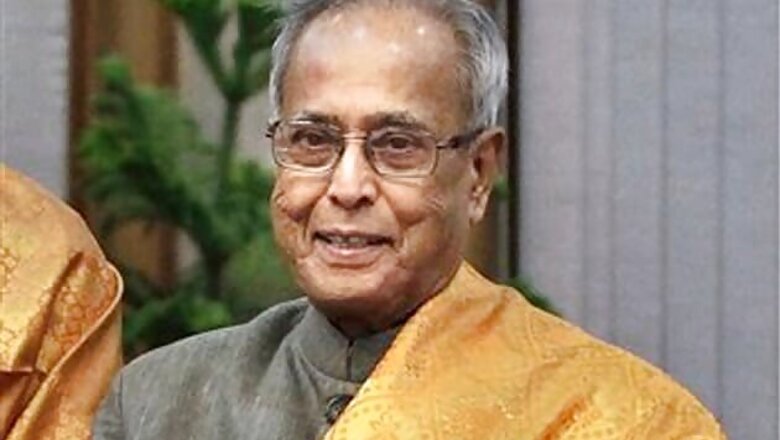
views
New Delhi: The ballot has been cast in the presidential elections, with the numbers heavily tilting in favour of UPA candidate Pranab Mukherjee against former Lok Sabha speaker P A Sangma. The results of the elections will be announced on Sunday.
As the MPs and the MLAs voted for the 13th President of the country, Prime Minister Manmohan Singh and UPA chairperson Sonia Gandhi were among the earliest voters. They were joined by the man of the moment, Pranab Mukherjee and Congress general secretary Rahul Gandhi.
Among the other early voters were Samajwadi Party chief Mulayam Singh Yadav, Bahujan Samaj Party (BSP) supremo Mayawati and Nationalist Congress Party (NCP) president Sharad Pawar.
From the Opposition, Bharatiya Janata Party (BJP) leaders Murli Manohar Joshi, Anurag Thakur, Yashodhara Raje, Biju Janata Dal (BJD) leaders B Mahtab, Baijayant Panda, P K Patsani, were among the early voters.
Later, Trinamool Congress chief Mamata Banerjee and YSR Congress supreme Jaganmohan Reddy also cast their vote. Also, Trinamool Congress MP Derek O' Brien became the first Anglo-Indian to vote in a presidential election.
The voting on Thursday for the next President of the country also witnessed its share of drama.
Samajwadi Party chief Mulayam Singh Yadav, by mistake, voted for Sangma, following which he was granted the permission to cast his vote again. He then voted for the Mukherjee, to whom he had declared his support in June itself.
In another instance, Gujarat BJP MLA Kanu Kalasariya whipped up some drama by going against his party and voting for Pranab Mukherjee.
Meanwhile, in Odisha, the vote of suspended BJD MLA Prabhat Biswal's vote in the presidential election was rejected for allegedly showing the ballot paper after voting.
The vote of Biswal, suspended from the ruling BJD for anti-party activities after the failed coup bid against the Naveen Patnaik Government in May, was rejected by Presiding Officer Amiya Sarangi.
Biswal's vote was rejected on the ground that his ballot paper was shown to the presiding officer after the legislator from Cuttack-Chowdwar had cast his vote, Sarangi said adding that as per rules one cannot show the ballot paper before dropping it in the box.
Biswal, however, claimed that the ballot paper needed to be folded four times before being dropped in the box while he had folded it twice and would have completed the process before putting it in the box. "It was not a deliberate act. It simply did not occur to me," Biswal said.
BJD's agent present in the polling booth also did not raise any objection to the decision of the presiding officer to reject Biswal's vote. Another suspended MLA of BJD Bibhuti Balabantray, however, voted smoothly.
Meanwhile, Raj Thackeray's Maharashtra Navnirman Sena (MNS), which has 12 MLAs, decided to abstain from voting.
Besides the UPA and its four supporting parties - the Samajwadi Party, the BSP, the RJD and the JD(S) - NDA members JD(U) and Shiv Sena as well as the CPM and Forward Bloc had earlier declared their support for Mukherjee.
The CPI, RSP, the Telugu Desam Party and the Telangana Rashtra Samithi, which together have about 36,000 votes, had said that they would abstain from the voting.
Sangma, a former Lok Sabha Speaker, jumped into the fray playing the tribal card with initial support of the BJD and the AIADMK. The BJP and the Akali Dal decided to back Sangma, who quit the NCP, the party he founded with Sharad Pawar, to contest the election.
Presidential election: The process
The President of India is elected by an electoral college comprising MPs and MLAs.
- 776 MPs, all except nominated ones, cast their vote.
- 4120 MLAs cast their vote.
- 708 votes is the value of each MP's vote.
- Meanwhile, the value of an MLA's vote is variable. It depends on the population of the state the MLA represents.
Pranab vs Sangma: How the numbers stack up
Support for Pranab: UPA (+TMC) + RJD + SP + BSP + JDS + CPM + FB + NDA allies (Shiv Sena and JDU) = 66.7 per cent
Support for Sangma: BJP + SAD + JMM + BJD + AIADMK = 30.3 per cent
Undecided parties: TDP + others = 3 per cent
(With Additional Inputs from PTI)


















Comments
0 comment